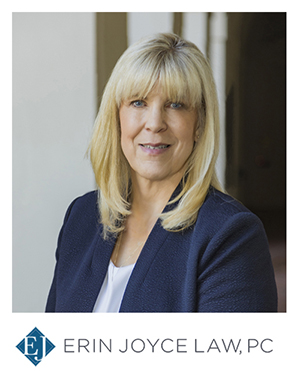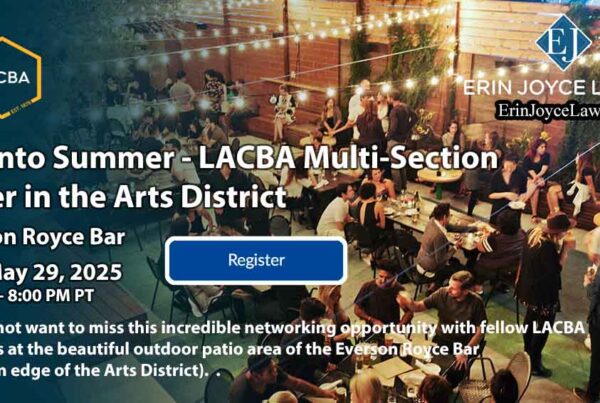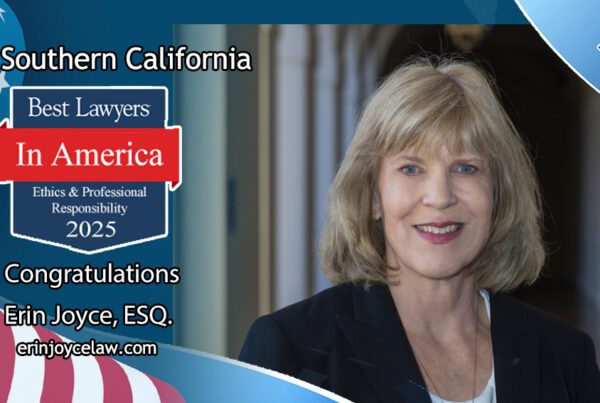No Good Deed Goes Unpunished – Complying with the Rules of Professional Conduct
By Erin Joyce
With jury trials for injured plaintiffs continued for months under COVID restrictions, injured clients justly need advances to make ends meet. Under California’s Rules of Professional Conduct, an attorney may advance a loan for reasonable living expenses to a client during litigation, just as an attorney may agree to advance litigation costs. However, the attorney needs to comply with certain requirements to avoid violating mandatory ethical rules. Even where the attorney is motivated to help a client survive hard times, compliance with Rules 1.7, 1.8.1 and 1.8.5 (former Rule 4-210) is crucial to avoid discipline.
California courts have long approved of advances under certain circumstances. (Hernandez v. Siegel (2014), 230 Cal.App.4th 165 (“the rule’s exception does not make it ‘entirely permissible for a plaintiff ’s lawyer to bear the cost of litigation in a contingency agreement.’ ‘Advance,’ in this context, means ‘to supply or furnish in expectation of repayment.’” (citation omitted))Demanding rules govern such advances. First, Rule 1.8.5 generally prohibits advances to clients as follows:
(a) A lawyer shall not directly or indirectly pay or agree to pay, guarantee, or represent that the lawyer or lawyer’s law firm will pay the personal or business expenses of a prospective or existing client.
Despite this overall prohibition, attorneys may provide a loan when Subpart (b)(2) is met:
(2) after the lawyer is retained by the client, [that lawyer may] agree to lend money to the client based on the client’s written promise to repay the loan, provided the lawyer complies with rules 1.7(b), 1.7(c), and 1.8.1 before making the loan or agreeing to do so;
Under these two subparts, an attorney can pay all litigation costs necessarily incurred and living expenses so long as the attorney negotiates a loan with the client, that loan does not create a conflict of interest in violation of Rule 1.7, and that loan complies with separate rules for entering into transactions with clients (see Rule 1.8.1 or former Rule 4-210 (also allowing advances but only within specified exceptions).
Attorneys must consider the impact of conflicts of interests governed by Rule 1.7. Advancing necessary living expenses to a current client in most circumstances will not create such conflicts. Any arrangement where the client is required to switch counsel to obtain the loan would violate Rule 1.8.5.
Rule 1.8.1 also contains numerous mandatory requirements. Subpart (a) requires that a loan be “fair and reasonable.” The lawyer’s role must be disclosed to the client “in a manner that should reasonably …[be] understood by the client.” “Reasonableness” under Subpart (a) is measured at the time when the loan is made. Rule 1.8.1 Subpart (b) requires that the client be informed that they have the right to seek independent counsel. A meeting with another attorney is not required, just a reasonable opportunity before the agreement is finalized. Subpart (c) requires informed written consent “to the terms of the transaction… and to the lawyer’s role in it.”
Case law has further requirements: the loan needs a due date and all the relevant terms detailed in writing. (Hunniecutt v. State Bar (1988), 44 Cal.3d 362, 373 (absence of security indicates unfairness); In the Matter of Hultman (Review Dept. 1995), 3 Cal. State Bar Ct. Rptr. 297, 307). The burden of showing fairness is on the attorney, not the client. “When an attorney-client transaction is involved, the attorney bears the burden of showing that the dealings between the parties were fair and reasonable and were fully known and understood by the client.” (Hunniecutt v. State Bar (1988), 44 Cal.3d 362, 372–373).
Attorneys may face discipline even on no-interest loans. The State Bar Review Department recommended a 60-day actual suspension for misconduct due to an “unfair transaction” stemming from a loan of $100,000 to a client in part due to a failure to obtain written conflict waivers. (In the Matter of Lane, (Review Dept. 1994), 2 Cal. State Bar Ct. Rptr. 735).
Again, “no good deed goes unpunished.” Even with the best intentions, ignoring ethical rules should result in discipline. “When an attorney enters into a business transaction with a client, the attorney must, at his or her peril, comply with [former] rule 3–300.” (In the Matter of Gillis (Review Dept. 2020), 4 Cal. State Bar Ct. Rptr. 387, 394).
It is tempting to provide an advance to a client who needs to make a critical rent payment or mounting bills with no job to support the client’s family. Attorneys should fully document the loan in compliance with California’s ethical rules to avoid discipline for misconduct.
Erin Joyce specializes in State Bar defense, moral character proceedings and ethics consultations. In her more than 18 years as a State Bar prosecutor, she gained extensive experience in State Bar investigations and disciplinary proceedings. She has handled all aspects of discipline cases against attorneys in State Bar Court, from the filing of the complaint through trial and review. She has personally tried dozens of State Bar trials and several appeals, and she has a comprehensive understanding of how State Bar investigations and proceedings unfold. She can be reached at (626) 314-9050 and erin@erinjoycelaw.com.

Erin is a former 18 year State Bar prosecutor now focusing on ethics consultations for small and mid-sized firms and State Bar defense.
Erin Joyce Esq.
117 East Colorado Blvd., Suite 465 Pasadena, California 91105
Call: 626.314.9050
Email: erin@erinjoycelaw.com
LAW IN THE NEWS

Sip into Summer – LACBA Multi-Section Mixer


Top Professional Responsibility Lawyers 2025
CONTACT ERIN JOYCE LAW
REPRESENTING CLIENTS THROUGHOUT ALL OF CALIFORNIA
When you get a letter from the State Bar, don’t go it alone! You need competent, experienced counsel to respond to the State Bar at every stage. Your license is at risk, so ensure you have the best representation from a former State Bar prosecutor before sending any response to an investigator or responding to formal charges leveled by the State Bar. You cannot make an informed decision without good advice. Call Erin now.











